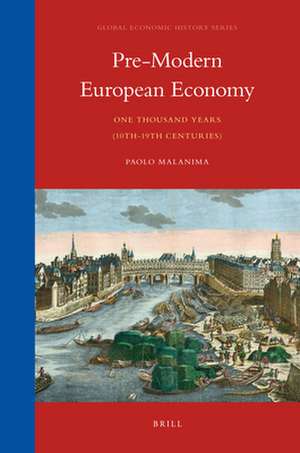Pre-Modern European Economy: One Thousand Years (10th-19th Centuries): Global Economic History Series, cartea 5
Autor Paolo Malanimaen Limba Engleză Hardback – 30 aug 2009
The main aim of the book is to present a clear picture of the structure and organisation of the European pre-modern economy, specifying its features, institutions, constraints and differences with other traditional coeval economies. The path followed starts from the demographic characters, the techniques, the sectors (agriculture, trade, industry), the output, and continues with the demand side (consumption, investment, public expense). The last chapter recalls the main features of the pre-modern economy in a more formal way.
The book is the only available work dealing with the formation of the European economy and its features over the long term, that is from the 10th until the 19th century.
Preț: 908.17 lei
Preț vechi: 1107.52 lei
-18% Nou
Puncte Express: 1362
Preț estimativ în valută:
173.78€ • 179.28$ • 145.02£
173.78€ • 179.28$ • 145.02£
Carte indisponibilă temporar
Doresc să fiu notificat când acest titlu va fi disponibil:
Se trimite...
Preluare comenzi: 021 569.72.76
Specificații
ISBN-13: 9789004178229
ISBN-10: 9004178228
Pagini: 428
Dimensiuni: 160 x 240 x 28 mm
Greutate: 0.82 kg
Editura: Brill
Colecția Brill
Seria Global Economic History Series
ISBN-10: 9004178228
Pagini: 428
Dimensiuni: 160 x 240 x 28 mm
Greutate: 0.82 kg
Editura: Brill
Colecția Brill
Seria Global Economic History Series
Cuprins
I Population
1.World population
2.The European population
3.The demographic model
4.The death rate
5.The birth rate
6.The demographic transition
7.Conclusion
II Energy
1.Energy systems
2.Fuel
3.Animals
4.Water and wind power
5.Climate and the biomass
6.The energy transition
7.Conclusion
III Agriculture
1.Men and lands
2.Three agricultural ecosystems
3.Peasant economies
4.The village and the manor
5.Land productivity and labour productivity
6.Conclusion
IV Trade
1.Seas
2.Rivers, roads, fairs, markets
3.Innovations in exchange
4.Conclusion
V Industry
1.Types of industry
2.From South towards North
3.Industrial technology and organisation
4.Urbanisation
5.Conclusion
VI Output
1.Prices and agricultural incomes
2.Wages and productivity in industry
3.GDP
4.Conclusion
VII Demand
1.Consumption
2.Investment
3.Public expense
4.Conclusion
VIII Pre-modern economies
1.Past and present economies
2.A model of an agrarian economy
3.Distribution
4.A dualistic economy
5.The mature agrarian economy
Bibliography
1.World population
2.The European population
3.The demographic model
4.The death rate
5.The birth rate
6.The demographic transition
7.Conclusion
II Energy
1.Energy systems
2.Fuel
3.Animals
4.Water and wind power
5.Climate and the biomass
6.The energy transition
7.Conclusion
III Agriculture
1.Men and lands
2.Three agricultural ecosystems
3.Peasant economies
4.The village and the manor
5.Land productivity and labour productivity
6.Conclusion
IV Trade
1.Seas
2.Rivers, roads, fairs, markets
3.Innovations in exchange
4.Conclusion
V Industry
1.Types of industry
2.From South towards North
3.Industrial technology and organisation
4.Urbanisation
5.Conclusion
VI Output
1.Prices and agricultural incomes
2.Wages and productivity in industry
3.GDP
4.Conclusion
VII Demand
1.Consumption
2.Investment
3.Public expense
4.Conclusion
VIII Pre-modern economies
1.Past and present economies
2.A model of an agrarian economy
3.Distribution
4.A dualistic economy
5.The mature agrarian economy
Bibliography
Notă biografică
Paolo Malanima graduated from the University of Pisa and Scuola Nornale Superiore. He has been Professor of Economic History at the University of Pisa, and of Economic History and Economics at the University Magna Graecia in Catanzaro. He published on Italian and European economic History. He is now Director of the Institute of Studies in Mediterranean Societies (ISSM-CNR).










